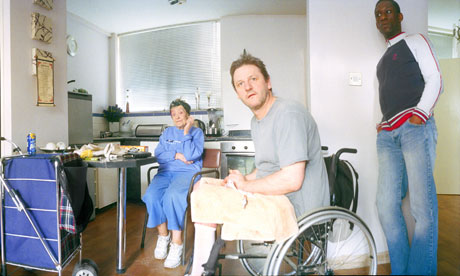
John McDonagh used to be a bare-knuckle fighter, and in his career fought countless times without losing. He is 65, an Irish traveller and cannot read or write. He is also one of our patients at Shoreditch Park Surgery in Hackney. It was John who sowed the seed of the idea for a photography project that we embarked on this summer, while the eyes of the world have been on east London.
It was clear that John's past was vital to understanding the man he is now. How might he respond to soft public health messages about eating five portions of fruit and veg a day, and other healthy lifestyle measures? My colleagues and I discussed how we could talk to John about health in a way that would be meaningful to him.
Because GPs are generalists, with a broad-based training across different specialities, we can manage nine out of 10 problems that patients brings to us. Inner-city GPs deal with a higher proportion of patients who live in poverty or face violence, and we look after high numbers of children at risk of harm. The problems are varied: they can be mental, social or physical in origin. Frequently they are a combination of all of these factors.
Increasingly in medicine, through computers and financial incentives, GPs are encouraged to focus on things that can be measured, such as blood pressure and test results. Improving the standards of chronic-disease management and reducing variation across GP practices is clearly important, but this target culture with its focus on the disease model (diagnosing conditions such as diabetes, hypertension, asthma) means we are at risk of losing something valuable: the patient's own story.
Our health and wellbeing are bound up with our lifetime experiences and this is the context in which the measurable should be placed. Like GPs everywhere, each day we bear witness to extraordinary stories about people's lives. To highlight this we decided to visit some of our patients at home, accompanied by the Swiss photographer Michael von Graffenried, who used his trademark panoramic camera, enabling him to take photos with a 140-degree aspect without his subjects feeling self-conscious.
Reading this on mobile? Click here to view.
The surgery is situated in one of the most ethnically and culturally diverse – and deprived – areas of the UK. We have 7,000 people registered and at the last count patients from over 70 different countries. Normally, the only homes I visit are those of people who are elderly, housebound or at the end of their lives. This time there was no illness or disease on my agenda.
You can learn a lot about people from talking to them in their own environments. Now I understand why Ilham Mohammed, 26, a Somalian mother of three, keeps coming to the surgery with headaches: her husband is still living in Mogadishu and she fears for his life. Henry Biddle is the fittest 87-year-old on our list, swimming 40 lengths every morning. Paul Fleming, 46, described how being HIV-positive has made him kinder and more appreciative. It was humbling to hear Mustaffa Najims talk about his torture in Iraq, and how it still impacts on his life.
Everyone who took part gave consent for their stories and photographs to be used in an exhibition that is currently on display in the surgery and open to all. Sponsored by the Royal College of GPs, it will transfer to their new headquarters this October.
Tony Kirwan, 44, pictured above in a wheelchair, says of the experience: "Reading about the other people's problems and their lives in this community has opened up a lot of things in my mind. I was drinking at the time, and I look at my photo now and I seem different. It has made me realise I am stronger and I don't want to go back."
As a colleague commented, if you want to know what GPs do, come and see the show. We hope that it will create a debate in healthcare about how we measure the valuable rather than simply valuing the measurable.
What Counts Rather Than What Can Be Counted is at Shoreditch Park Surgery, 10 Rushton Street, London N1 5DR until 30 September, Mon to Fri, 9-6pm. mvgphoto.com

